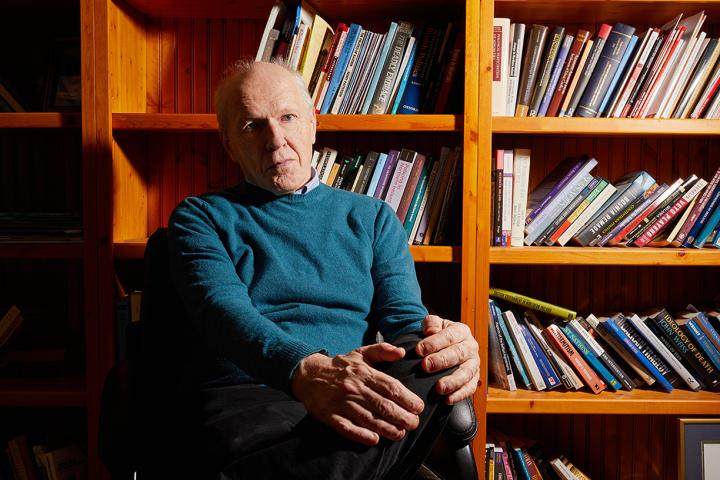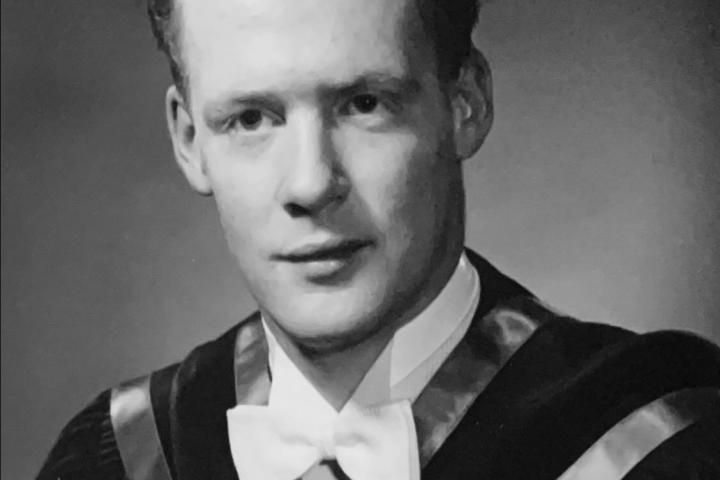Anita Anand, Artsci’89, saw the world of Queen’s from both sides, earning her first of several degrees before returning to Kingston as a law professor. After teaching at the University of Toronto, Ms. Anand entered politics and won the seat in the House of Commons for the Ontario riding of Oakville in 2019. She was named Minister of Public Services and Procurement and later became the second woman, and the first racialized woman, to assume the role of Minister of National Defence following her re-election in 2021. On July 26, she became the President of the Treasury Board.
Let's start with your parents, growing up in a small town of Kentville, Nova Scotia, and how that influenced you?
When I think back to those days, we didn't really realize it then because we were so young but we were one of a few South Asian families in the province. As doctors, my parents set up their medical practices, immersed our family in the life of the Annapolis Valley, and encouraged us to get involved with extracurricular activities. We were in every activity — swimming lessons, gymnastics, skiing, cross-country skiing, I played basketball, and volleyball and ballet and piano. I mean, there was no time in the schedule for anything else. I think maybe they thought, “we’ll embrace this life the best we possibly can,” and in the process of doing so, they opened many doors and taught us that we belonged. The community was so incredible to my family and to us, the three daughters. We were very integrated within it. I don't know if your childhood was like this, but you know, after supper, all the kids in the neighbourhood used to come outside and we played hide and seek or Red Rover or whatever. Until it got dark, and our parents would call us in, and then we'd do the same thing the next day. So, it was really community oriented in a way that I don't see that much of today. Looking back, it was idyllic, and we loved every minute of our life in Nova Scotia.
Let's go from there right to your new home of Oakville and being part of that community. It sounds like you transplanted what you learned in Kentville to there.
Now, oh my gosh, you're so funny. No one's ever pointed this out before, but it is true that when I was looking for a place to raise my family, I wanted a place where my kids could have a similar type of upbringing — a small town with a downtown core and with subdivisions surrounding that area. And then my parents lived in Georgetown, my younger sister in Hamilton and my other sister in Etobicoke — I was the middle child – and we always used my place as a meeting place. My mom always used to tell me that she wanted me to run for political office, and I don't recall her saying that to my sisters. She was very ambitious for us. She would just walk by us while we were playing with our friends, and she would just say things in passing like “Oxford or Cambridge for you?” or “lawyer or doctor?” And, you know, if we got 98% on a test, that was never good enough, she would always say: “Well, what did you get wrong?” And that continued on. I remember when I became a lawyer, she asked me at that time whether I was going to become a doctor. I just became a lawyer! When I became a professor, she said, “How about a judge?” So, it just never stopped. When we were little, we found it kind of annoying, but when we got older, we found it kind of endearing. It was just the way she was, right up until her very last day. She just kept always telling us keep going and don't stop.
What influenced your decision to leave Kentville and go to Kingston?
When I was making the decision about where I was going to university, there was no Internet, we didn't do college visits, there was no information like there is today to help you make your decision. I chose to go to Queen’s as it had, and continues to have, a strong reputation in undergraduate studies. I didn't know much about Kingston, but once I arrived, I realized it was very much like Kentville. Queen's felt very much like Acadia University where we did our swimming lessons, gymnastics, and our piano recitals. It felt very homey to me and all kind of made sense. When I decided to go to Queen's, my parents moved the family to Napanee, near Kingston. My younger sister then came to Queen's and we lived together.
Now there were a bunch of things in between but you ended up back at Queen's as a professor.
Yes! It was strange to come back as a professor to the institute where I had studied, but I was so honoured to do so. While I've been a professor in other universities, I felt a special connection with Queen's. At first, I had a hard time calling professors by their first names and I'd walk the halls of Mackintosh-Corry Hall or Richardson Hall, still feeling like a student. It was very discombobulating, but it was fun, too, because my dad was still practicing medicine and he came to lecture in the medical school and my mom did some lecturing on Mahatma Gandhi that I was able to set up. They still had a big community of friends — the Indian community, and especially in Kingston is quite large — so we were able to relive some of the good old days back in the early 2000s.
The world of academia is very different from the world of politics. How do you see the two things?
In politics you're making decisions on a very rapid basis and these decisions affect thousands, if not millions, of people. The magnitude of what we do every day is never lost on me. That said, I don't think you can change your personality simply because you change a career. So, for better or for worse, my vocabulary is my vocabulary and I'm not going to be able to undo that in a year or two or the three-and-a-half years since I was elected. My professional career has been in the legal world and in the academic world and, I think, you can use those skills to do so much in government. Now, some of the students I taught in my years, including at Queen's, are Members of Parliament, or lead organizations across the country, and I run into them as Minister. It's quite incredible to see where your students go, and how they evolve, and how your teaching helps them become who they are.
What did you learn at Queen's that really stayed with you after you left?
Two things. First, I found my legal background very helpful when I was undertaking COVID-19 vaccine procurement as Minister of Public Services and Procurement Canada. Actually, the first course I taught at Queen's was contract law. The study of contract law has a focus on negotiation and contractual provisions, allowing you to get the goods, while remaining flexible to account for any changes in the contract. From my experience, the circumstances are really salient. I had many discussions with Professor Nicholas Bala, who was teaching contracts at the same time as me. He was a very good mentor and ensured that I had the support that I needed from a contract law perspective. Professor Martha Bailey also taught contracts during the same time and answered any questions I had as a new professor. It was a wonderful time, and I had a lot of professional support. Second, I will never forget how my workplace supported me after my fourth child was born. I had professors stepping up to invigilate my exam for me, Martha Bailey brought the exams over to my house, so I could grade them, and I had another colleague offer to do a review class for my students. We were a very tight and close community. I spent the first six years as a full-time professor there, and it was just an incredible place to be. I miss the faculty so much.
Is there a particular event or experience there that you draw on a lot?
It's not an event per se. I was extremely happy during those years; I laughed a lot and was part of a very close community. You realize it when you're gone and you remember how happy you were when you were there. I think the question is — if I could be so bold — is what was it that brought this community so close together? Although the answer is hard to pin down, I would say that the Faculty of Law was in a rebuilding phase and that there were multiple new hires. I was one of three people hired by the dean at the time, Alison Harvison Young, who saw potential in me. I remember she asked me “why I should hire you” and I replied “because I have a fire in my belly.” She always reminds me that I said that. I didn't quite remember it that way, but she always says that was a pivotal moment in our conversation. Queen’s gave me the ability to work really hard and to raise my young family with the support of my community. And what more could you ask for? That's incredible.
Can you talk about your undergraduate years?
I studied political studies as my major and history as my minor. So, I spent all my time in Mack-Corry, or Watson Hall. For my electives, I did a bunch of courses in German and French, and drama and sociology. I loved my undergrad. It was just so eye opening. I wrote, obviously, so many essays for my courses and we had great professors. I knew Queen's had a very good reputation in their political studies department, and that continues to be the case. I was enthusiastic about the course offerings in political studies, and the complement between political theory and more practical courses. This education occurred against the backdrop of Glasnost, and it was an incredible time to be a student of political science. While I was at Queen's, I was the head of the anti-apartheid student group run by the Alma Mater Society, so it was also an interesting time, especially as countries were imposing sanctions against South Africa.
And final thoughts about your time at Queen's?
The Queen’s community gave me “legs” to keep going. I gained a strong academic foundation as a student and saw incredible potential among my students, as a professor. As I think about this diverse group of students, I reflect on the need for more racialized Canadians and members of other minority groups in politics — our government is better when it looks more like our demographic population! In terms of my own future, I have more road to travel, but the foundation built in my undergrad and then as a professor has been undeniably important in allowing me to carry on. One’s strength is based on our history, our families, and our communities, and in retrospect, I couldn't have asked for more.

